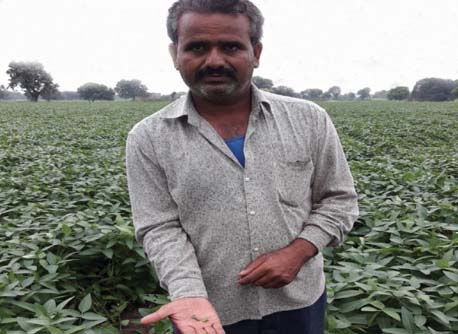
For many
farmers of India, farming remains to be a gamble due to erratic monsoon. The
challengs multiplied due to pandemic triggered lockdowns. In such situations,
farmers like Kaalu Singh have to reckon with the forces of nature..
Kaalu Singh, a diligent farmer from Kanka Khajuria, district
Dewas, sows soybean regularly to increase his revenue from a geographical
location known for soybean cultivation. Farming is his only means of
livelihood. His experience in farming has been full of ups and downs, and he
often recalls how farming changes in a short span of time. Many important
events in soybean farming have taken place since the last decade.
New advancements in farming techniques and the choices in
variety has changed the face of agriculture as we know it. With improved
fertilisers, pesticides, and sowing techniques, farmers have witnessed
remarkable growth in soybean cultivation. Despite all the novel advancements in
farming, farmers are still vulnerable to the unbridled calamities arising from
climate-induced challenges. Incessant and intermittent rains, sudden and
unforeseen hail storms have even riddled the experts from the field of
climatology. Against this background, the best way to understand climate is by
addressing it as “unpredictable”.
This unpredictability of monsoon has left several farmers in
considerable losses due to the decrease in productivity. Almost everycrop would
show evidence of a reduction in final yield triggered by excessive moisture,
increased pestilence, drought and dry spells. Soybean is no different. Kaalu,
like other farmers from the district, was on the receiving end for the longest
of time. His losses peaked at almost 60 per cent of the decline in total
productivity due to prolonged dry spells and diseases triggered by the erratic
monsoon.
Kaalu shares his doleful journey – “My friends and I have been
observing the severity of climate change for a long time. These unforeseen
changes left us in distress every time we thought of starting afresh.” Kaalu
admits that the price of agricultural inputs has also been a massive hurdle. In
his small piece of land, the cost of production has grown exponentially with an
increase in the prices of agricultural inputs, labour, and fuel. The rising
price of transportation and the precarious state of Mandi (APMC – Agriculture
Produce Market Committee) due to Covid-19 lockdowns has further bred farmers’
insecurities. “The pandemic has been like a nightmare. It is incredibly
challenging to procure chemicals, fertilizers, and pesticides during and around
the lockdowns.”
Kaalu and his farmer friends have realized that the erratic
monsoon and pandemic challenges are meant to last for a long time, and the best
way forward is to brave the challenge. Under the guidance of knowledge partners
like Krishi Vigyan Kendra and CIAE, Solidaridad has conducted numerous training
exercises for the farmers of the Dewas district. The activities aim to minimize
production costs, increase productivity, and improve soil health by using organically
produced bio fertilizers and growth enhancers. With the use of waste
decomposer, farmers have developed a habit of enhancing soil fertility using
organic compost. Along with soil conditioning, farmers like Kaalu also learned
to prepare their field with climate-resilient techniques like Broad Bed and
Furrow. They preferred seed varieties resilient to pest and torrential rains
and received an overwhelming response in the final production. Many farmers,
along with Kaalu, are advancing towards the coming Kharif season with a renewed
confidence in farming.
This confidence is a direct result of training, demonstration,
and awareness sessions. Calculated moves which are planned well in advance can
pave the road to sustainable farming for the smallholder community of Madhya
Pradesh. Several farmers are still oblivious to the climate-resilient practices
and place their bets on uncertainties of monsoon. Adopting new and improved
farming techniques by smallholder farmers is bound to encourage sustainability
in the long run.
A contest with the forces
of nature is unavoidable, but with proper guidance and support, farmers like
Kaalu gets a fighting chance that was earlier out of their reach. Good Farming
– Good Food committed to improving the face of agriculture in the rural farming
community of Madhya Pradesh. With support from leading partners, the programme
aims to touch thousands of farmers and improve their livelihood.
